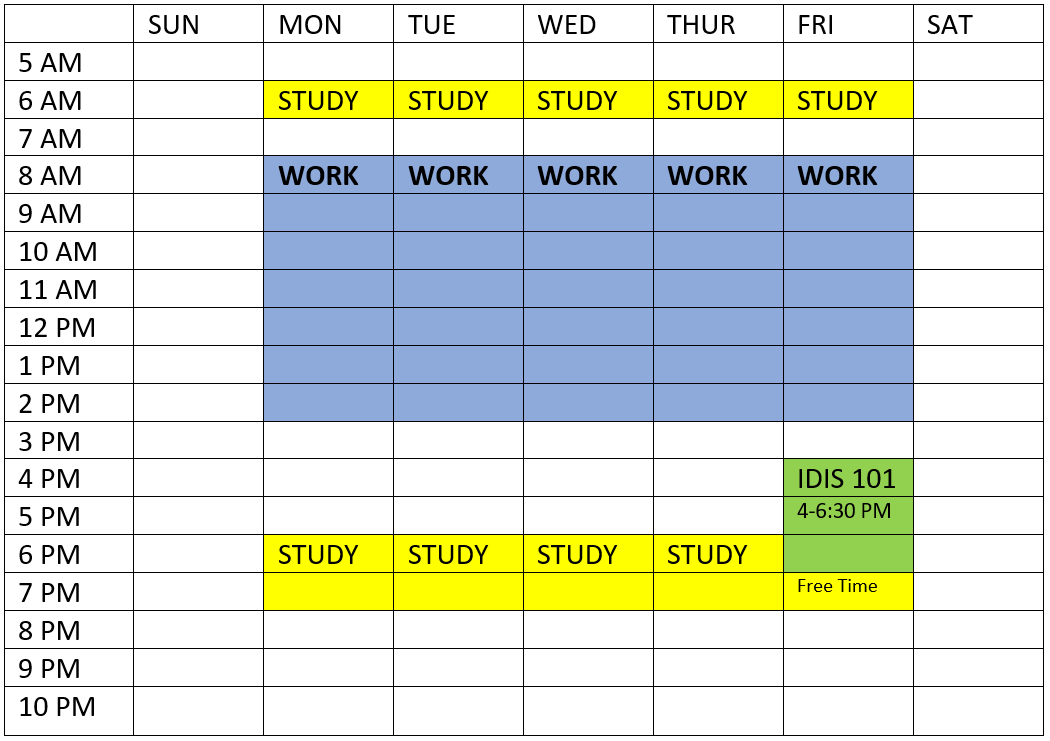2 Class Preparation and Attendance
Dave Dillon and Alise Lamoreaux
Prepare for Class
Kai feels like he is struggling through his first semester of college. Making the decision to study while being incarcerated has been challenging. Faced with little study-time and other limitations, he is often too tired for homework or studying. He has trouble focusing during class and occasionally drifts off during lectures. In addition, he is constantly worried about his family, and the responsibilities he will be faced with upon being released from prison. Kai knows he needs to change some of his habits, but he feels too overwhelmed to know where to start.
Lots of students like Kai have to balance a lot of responsibilities, such as work, school, and family. Such competing demands can make it hard to get the most out of class time and assignments. The effort you put in to succeed in college will pay off, though, and there are ways that you can physically and mentally prepare to excel in class.
Eat Healthy Meals and Snacks
Sometimes students get so busy that they skip meals like breakfast or lunch and then resort to junk food and coffee or caffeinated drinks to get them through. While a candy bar and soda might give you a temporary boost, you’ll soon feel tired and hungry again. Eating healthy meals and snacks that contain lean protein, vegetables, and fruits will give you the energy needed to accomplish all of your daily tasks.
Exercise Regularly
Similarly to healthy eating, exercising can give you energy throughout the day. Physical activity can also help prevent you from getting sick, which can lead to missed classes and work and lower grades. According to the Center for Disease Control and Prevention (CDC), college-aged students should get at least 2.5 hours of exercise each week.
Get Enough Sleep
Sleeping is like recharging your personal battery each night for the next day. However, studies show that on some campuses like the University of Alabama, 60 percent of the student population doesn’t get adequate sleep. Although some students will need slightly more or less sleep, most should aim for eight hours every night. Along with getting enough sleep, students can practice healthy habits to sleep soundly, like avoiding caffeinated beverages before they go to bed and reading instead of using electronic devices before bed to help the body start to relax.[1]
Manage Stress
According to a recent American Psychological Association (APA) study, more than half of college students who used their school’s counseling services cited anxiety as the reason they sought help. Other stress points included relationship and academic problems. Stress management will look different for each student. For some students, the solution might include exercising. Other students might want to make time each week to meditate, go out with friends, spend time with pets, listen to music, or work on arts-and-crafts projects. Regardless of which activities you enjoy, it’s important to make time for stress management in your schedule.[2]
Talk to Instructors or Second Chance Staff Members
Instructors are good resources to help you learn strategies for being successful both in and out of the classroom. Your instructor might be able to give you additional studying resources for any concepts you find difficult, so you can catch up for future classes. A Second Chance staff member can connect you with the appropriate resources for success.
Sometimes student success can be as simple as changing your mindset. For example, if you identify what makes you happy and brings you positive thoughts, you might generate more motivation and enthusiasm for schoolwork and class time.
Class-Time to Study-Time Ratio
Kai is encouraged to create a schedule to better manage his time. With the number of daily counts and prison obligations, it can be difficult to create a schedule that he can stick with. Nonetheless, Kai knows that in order to be successful, he must manage his time as much as possible. Kai is confident that he can make additional time for studying throughout the day, and plans to use the designated study sessions included in his program to the best of his ability. Kai created a rough schedule to further refine as he goes through the next couple of weeks.
Although Kai knows that studying is important and he is trying to keep up with homework, he really needs to work on time management. This is challenging for many college students, especially ones with lots of responsibilities outside of school. Unlike high school classes, college classes meet less often, and college students are expected to do more independent learning, homework, and studying. The amount of time students spend on coursework outside of the physical classroom will vary, depending on the course (how rigorous it is and how many credits it’s worth) and on the institution’s expectations. However, a general rule is that the ratio of classroom time to study time is 1:2 or 1:3. That means that for every hour you spend in class, you should plan to spend two to three hours out of class working independently on course assignments. For example, if your composition class meets for one hour, three times a week, you’re expected to devote from six to nine hours each week on reading assignments, writing assignments, etc.
If you account for all the classes you’re taking in a given semester, the study time really adds up—and if it sounds like a lot of work, it is! The only way to stay on top of the workload is by creating a schedule to help you manage your time. You might decide to use a weekly or monthly schedule—or both. Whatever you choose, the following tips can help you design a smart schedule that’s easy to follow and stick with.
Start with Fixed Time Commitments
First off, mark down the commitments that don’t allow any flexibility. These include class meetings, work hours, appointments, etc. Capturing the “fixed” parts of your schedule can help you see where there are blocks of time that can be used for other activities.
Kai’s Schedule
Kai is taking one class this fall and has a fixed work schedule.
Consider Your Studying and Homework Habits
When are you most productive? Block out your study times accordingly, and make sure you have the proper resources such as class notes that are needed for success.
Kai’s Schedule
Since Kai starts his work schedule at 8:00 am every day, he decides to use that as the base for his schedule. Kai wakes up early every morning, and he knows that he can do a bit of studying before work. He will also have additional study-time after dinner, and during his free time on the yard. Please see the schedule Kai created below:

Plan Ahead
Even if you prefer weekly over monthly schedules, write reminders for yourself and keep track of any upcoming projects, papers, or exams. You will also want to prepare for these assignments in advance. Most students eventually discover (the hard way) that cramming for exams the night before and waiting till the last minute to start on a term paper is a poor strategy. Procrastination creates a lot of unnecessary stress, and the resulting final product—whether an exam, lab report, or paper—is rarely your best work. Try simple things to break down large tasks, such as setting aside an hour or so each day to work on them during the weeks leading up to the deadline. If you get stuck, get help from your instructor early, rather than waiting until the day before an assignment is due.
Consider Leisure Time
It might seem impossible to leave room in your schedule for fun activities, but every student needs and deserves to socialize and relax on a regular basis. Try to make this time something you look forward to and count on, and use it as a reward for getting things done. You might reserve every Friday or Saturday evening for reading a good book, or catching up family and friends.
Kai’s Schedule
When you look at Kai’s schedule, you can see that he’s left open Friday, Saturday, and Sunday evenings to do additional studying, if needed.
Now that you have considered ways to create a schedule, you can practice making one that will help you succeed academically.
Why Go to Class?
Students don’t always want to go to class. They may have required classes that they find difficult or don’t enjoy, or they may feel overwhelmed by other commitments or feel tired if they have early morning classes. However, even if instructors allow a certain number of unexcused absences, you should aim to attend every class session. Class attendance enhances class performance in the following ways:
- Class participation: If you don’t attend class, you can’t participate in class activities. Class activities are usually part of your final grade, and they can help you apply concepts you learn from lectures and reading assignments.
- Class interaction: If you rely on learning on your own (by doing the reading assignments outside of class, for example), you’ll miss out on class discussions with fellow students. Your classmates will often have the same questions as you, so going to class enables you to learn from them and ask your instructor about topics you all find difficult.
- Interaction with the instructor: There is a reason why classes are taught by instructors. Instructors specialize in the subjects they teach, and they can provide extra insight and perspective on the material you’re studying. Going to class gives you the chance to take notes and ask questions about the lectures. Also, the more you participate, the more your instructors will come to know you and be aware of any help or support you might need. This will make you feel more comfortable to approach them outside of class if you need advice or are struggling with the course material.
- Increased learning: Even though you will typically spend more time on coursework outside of the classroom, this makes class sessions even more valuable. Typically, in-class time will be devoted to the most challenging or key concepts covered in your textbooks. It’s important to know what these are so you can master them—also they’re likely to show up on exams.
Why Missing a Class Sometimes Makes Sense (though not often)
If You Need to Miss a Class

Class attendance is obviously important for academic success, but from time to time you may need to miss a class. Sometimes it can’t be helped. Since college classes have fewer sessions than high school, missing one class means missing more work. The following strategies can help you minimize the academic impact when can’t attend a class:
- Plan in advance: Although nobody can plan to be sick, students should give their instructors advanced notice if they know they will need to miss class for something like a doctor’s appointment. This is not only respectful to the instructor, but he or she may be able to give you any handouts or assignments that you might otherwise miss. If you anticipate that class will be canceled on account of bad weather, etc., make sure you have all the materials, notes, etc. that you need to work at home. In college, “snow days” are rarely “free days”—i.e., expect that you will be responsible for all the work due on those days when school reopens.
- Talk to fellow students: Ask to borrow class notes from one or two classmates who are reliable note takers. Be sure to also ask them about any announcements or assignments the instructor made during the class you missed.
- Do the reading assignment(s) and any other homework. Take notes on any readings to be discussed in the class you missed. If you have questions on the reading or homework, seek help from your classmates. Completing the homework and coming prepared for the next session will demonstrate to your instructor that you are still dedicated to the class.
Listening and Participating
Effective Listening Strategies
Physically showing up to class is important (especially if attendance is taken), but what you do once you’re there is equally important. Getting the most out of class time involves listening effectively, which means more than simply hearing what your instructors say. Effective listening involves engaging with the speaker and the material you hear in an active way.
To maximize the benefit you get from attending class, try to use the following active listening skills:

Effective listening skills start outside of the classroom with the students coming prepared with questions and comments.
- focus your full attention on the speaker
- ask questions, either out loud or internally, in response to what is being said
- paraphrase ideas in notes
- listen non-judgmentally
- show empathy for the speaker
Restating what you hear is a powerful strategy for being an active listener, but it’s obviously impractical in a roomful of other students. That’s why taking notes is so important. Think of it as a “silent” way to restate what you’re taking in. Focus on capturing the key ideas and on paraphrasing what you hear (rather than writing things down verbatim). Putting ideas into your own words will deepen your understanding and strengthen your ability to recall the information later.
Preparing ahead of time will also make listening more useful and engaging. Do any assigned reading before coming to class, using effective reading strategies discussed elsewhere in this course.
The Power of Listening
Listening is a skill that can (and should) be developed.
Effective Participation Strategies
Like listening, participating in class will help you get more out of class. It may also help you stand out as a student. Instructors notice the students who participate in class (and those who don’t), and participation is often a component of the final grade. “Participation” may include contributing to discussions, class activities, or projects. It means being actively involved. The following are some strategies for effective participation:
- Be a team player: Although most students have classmates they prefer to work with, they should be willing to collaborate in different types of groups. Teamwork demonstrates that a student can adapt to and learn in different situations.
- Share meaningful questions and comments: Some students speak up in class repeatedly if they know that participation is part of their grade. Although there isn’t necessarily anything wrong with this, it’s a good practice to focus on quality vs. quantity. For instance, a quieter student who raises her hand only twice during a discussion but provides thoughtful comments might be more noticeable to an instructor than a student who chimes in with everything that’s said.
- Be prepared: As with listening, effective participation relies on coming to class prepared. Students should complete all reading assignments beforehand and also review any notes from the previous meeting. This way they can come to class ready to discuss and engage. Be sure to write down any questions or comments you have—this is an especially good strategy for quieter students or those who need practice thinking on their fee.
The resource Class Participation: More Than Just Raising Your Hand can help you evaluate what you need to work on in order to participate in class more effectively.
Note-Taking
Effective note-taking helps students retain what they learned in class so that they can use the material to study and build their knowledge and tackle more complex concepts later on. In fact, research indicates that there’s a 34 percent chance that students will remember key information if it’s present in their notes but only a 5 percent chance if it’s not.[1] It doesn’t matter whether you prefer to write brief summaries or make visual guides and diagrams in your notes. The important thing is to find a note-taking strategy that works for you. The following are a few recommendations to try out:
- Stay organized: Keep your notes and handouts separate for each class. For example, you might have a different notebook and folder for each class, or a large notebook with a different tab for each class. This will save you the time of trying to organize and locate your notes when studying for an exam.
- Use visual cues: Try highlighting, underlining, or drawing arrows or exclamation points next to any main or difficult concepts. This will call attention to these sections and remind you to spend more time reviewing them.
- Group together similar concepts: Grouping or “chunking” material is a good way to make studying and memorization easier. You can try drawing the main concept and connecting it to smaller, related concepts or making an outline of the information. Either one can serve as an effective study guide.
- Make notes legible: Some people have messy handwriting. However, writing as clearly as possible when you take notes will make it easier to review them later. It’s also helpful if you’re asked to share your notes with another student who missed class. If laptop use is permitted during class, you can also type your notes.
